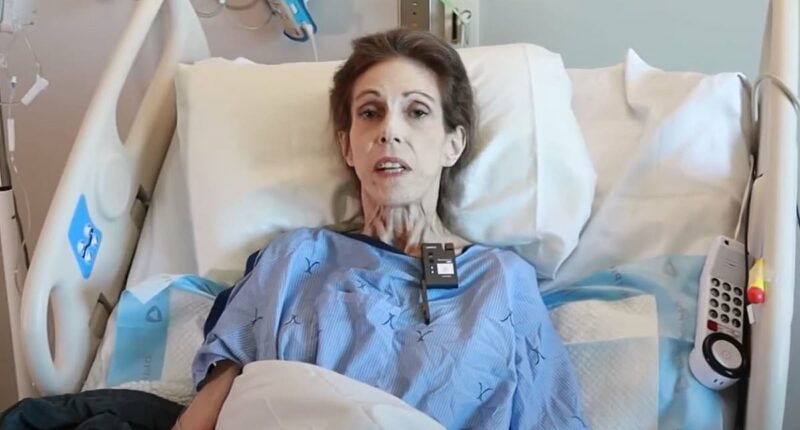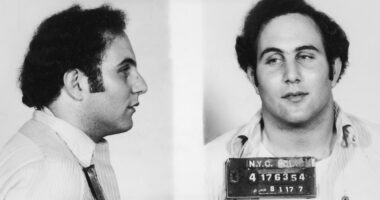Share this @internewscast.com
Tonja Johnson was a remarkable mother, seemingly able to juggle anything life threw her way. Standing at a statuesque 5 feet 10 inches, she was not only physically fit but also fiercely independent. Her talents extended beyond traditional roles, as she could single-handedly renovate a bathroom without breaking a sweat.
Her husband, Michael Johnson, fondly reminisced about her skills, noting how she could effortlessly install a toilet, sink, and countertop. These home improvement projects were a testament to her love for tackling challenges head-on in their Las Vegas, Nevada, residence.
However, their lives took a dramatic turn on November 1, 2021. Michael recalls that day vividly, as it marked a significant change for Tonja. She had decided to receive the Johnson & Johnson COVID-19 vaccine, motivated by the necessity to comply with vaccination requirements for her state job.
Within just 24 hours after the vaccination, Tonja began experiencing debilitating symptoms. Severe dizzy spells plagued her, causing her to lose her balance. The situation quickly escalated with excruciating chest pains, intense stomach discomfort, and bone-deep aches.
The relentless pain took its toll, making it impossible for her to eat, and she rapidly lost weight, dwindling to a mere 70 pounds. Her once vibrant and active lifestyle was reduced to reliance on a wheelchair, marking a stark contrast to the independent woman she once was.
She was in so much pain she couldn’t eat, withering away to just 70lbs in a matter of months and becoming reliant on a wheelchair.
‘[Since] I’ve gotten the COVID vaccine, I’ve had nothing but absolute horrific trouble,’ Tonja said in a tear-jerking testimony from her hospital bed before she died.
After a harrowing two years of extended hospital stays and grueling procedures, Tonja died in her husband’s arms on October 31, 2023, aged 57.

Tonja Johnson said her health rapidly declined after she got the Johnson & Johnson shot

Tonja, pictured with her son Masyn about 15 years ago, loved do-it-yourself projects before she became sick
Not only was Michael left to mourn the love of his life and the mother of his only child, he said he has also been burdened by immense medical debt and unanswered questions.
‘I think if she wouldn’t have gotten the shot, she would still be here,’ Michael said while sobbing. ‘We’d still have her.’
Tonja’s rapid deterioration left her doctors baffled, Michael said.
Doctors never conclusively linked her condition to the vaccine, but Michael remains convinced the timing was not a coincidence.
Her autopsy shows she died from lung failure, but the cause of death simply says ‘unknown.’
Dr Stuart Fischer, a physician based in New York City who did not treat Tonja, told the Daily Mail it was possible the vaccine played a role.
On the timing of her demise, he said: ‘It’s definitely suspicious. But there would be no way of knowing without proper tests, even then it would be difficult to tell.’
‘The vaccine was very controversial and had many side effects,’ he added, noting that the vaccine can result in ‘systemic problems’ within one’s body, starting just a day or two after the injection.
But not everyone in Tonja’s family is on the same page about her death.

Tonja underwent four grueling procedures while she was hospitalized
Shane Tilstra, Tonja’s estranged 37-year-old son from her previous marriage, believes alcohol played a role.
‘She had a drinking problem that I am sure did not help her health,’ Tilstra alleged, adding that he and Tonja had not spoken for about seven years before she passed.
He claimed his mother continued to drink after gastric bypass surgery over 20 years ago despite doctors warning her not to.
The surgery involves shrinking the stomach and connecting it further down the intestines, so food skips part of the gut and causes people to feel fuller quicker.
For gastric bypass patients, heavy drinking is especially dangerous.
The smaller stomach means alcohol hits the system faster, the rerouted intestines are more fragile and the liver is under extra strain.
This can trigger ruptures, ulcers and even deadly blood clots – complications Tonja suffered during her health battle.
Adding to the mystery is the fact that Michael claimed that Tonja had quit drinking several years before getting the vaccine – and she was actually healthier than ever.
In the months before her death, she was traveling to and from California to visit her parents and always playing with her precious dog, Jacks.

Tonja got the vaccine in order to keep her job with the state of Nevada, which she held for 15 years

Tonja kept a smile on her face even in her darkest moments
During the height of the pandemic, however, Nevada required all state workers to be vaccinated.
Tonja, who worked as an administrative employee at the state-run Rawson-Neal Psychiatric Hospital in Las Vegas, fell into that category.
She was hesitant, worried the shot had been rolled out too quickly, but feared losing her job of 15 years if she didn’t get it.
‘She waited until the last second to get the vaccine,’ said Michael, who never got the shot himself.
Her symptoms began the day after she received the Johnson & Johnson shot – and much of what she endured aligned with some of its rare side effects, according to case studies.
Months of suffering and unanswered questions followed before she was finally admitted to the hospital, where her condition spiraled out of control.
Her spleen had to be removed because it was bleeding – though doctors could not determine the cause.
A feeding tube was inserted to counteract her rapid weight loss, but the tube kinked and ruptured her intestine, causing sepsis.
Her stomach eventually shut down and had to be removed, and surgeons then discovered her esophagus was torn, explaining why she had struggled to eat.

Michael, left, said that Tonja, right, was hesitant about receiving the shot
When doctors investigated the pain in her chest and legs, they found blood clots had formed in her legs and traveled to her lungs.
After about six months in the ICU and another three at a long-term acute care facility, Tonja was finally able to return home. ‘She was starting to get better,’ Michael said.
But she required round-the-clock care, which Michael and their then-16-year-old son, Masyn, provided themselves.
Masyn switched to an online high school to take care of his mother and deal with his studies while his father worked.
Michael, who manages a grocery store, juggled work with taking Tonja to appointments. The ordeal drained their savings.
For Masyn, watching his mother suffer while he missed out on teenage life was devastating.
After eight months bedridden at home, Tonja’s condition worsened again. Three days later, she passed away. ‘I held her as she died,’ Michael said through tears.
Michael said Tonja had racked up $7.5 million in medical expenses, 80 percent of which was covered by insurance. He still owes about $40,000.
Ultimately, Michael feels the government never should have mandated the vaccine and it was simply rolled out ‘too fast.’
‘They were trying to do a good thing, but I think they’ve done more bad than they could ever do good,’ he said.
‘I miss her more and more every day.’
In rare cases, the Johnson & Johnson COVID-19 vaccine has been linked to the development of dangerous blood clots.

Pictured: Tonja
The single-dose shot was once hailed as a convenient alternative to Pfizer and Moderna’s two-dose regimens, but it quickly became one of the most controversial vaccines on the market.
Within months of its rollout in 2021, US health officials temporarily paused its use after a small number of women developed a rare but serious clotting disorder known as thrombosis with thrombocytopenia syndrome (TTS) – a condition involving blood clots and low platelet counts.
Although the suspension was lifted after further review, confidence in the vaccine never recovered.
By December 2021, the Centers for Disease Control and Prevention (CDC) formally recommended Americans choose Pfizer or Moderna instead, citing a higher risk of severe side effects with the J&J shot.
Eighteen months later, in May 2023, the Food and Drug Administration (FDA) quietly withdrew authorization for Johnson & Johnson’s vaccine, effectively removing it from the US market.
Out of roughly 18 million Johnson & Johnson doses administered, the CDC confirmed nine deaths linked to blood clots.
There have been a handful of reports of gastrointestinal issues after vaccination, but most involved the Moderna shot and patients with pre-existing conditions.
Researchers believe that, in rare cases, vaccines can spark an extreme immune or inflammatory response in which the body’s own immune system damages blood vessels supplying the esophagus.
The loss of blood flow can cause tissue death and lead to a rare condition known as acute esophageal necrosis, or ‘black esophagus,’ so called because the lining of the esophagus literally begins to die and darken.
In a statement to the Daily Mail, a spokesman for Johnson & Johnson wrote: ‘We sympathize with the family of Tonja Johnson for their loss.
‘The safety and well-being of every person who receives a Johnson & Johnson product is our top priority.
‘As a matter of policy, we do not comment on individual patient health information.’
The Daily Mail has reached out to the Division of Public and Behavioral Health of the Nevada Department of Health and Human Services, the agency that runs the Rawson-Neal Psychiatric Hospital.
The hospital where Tonja was treated declined to comment due to patient privacy laws.

















